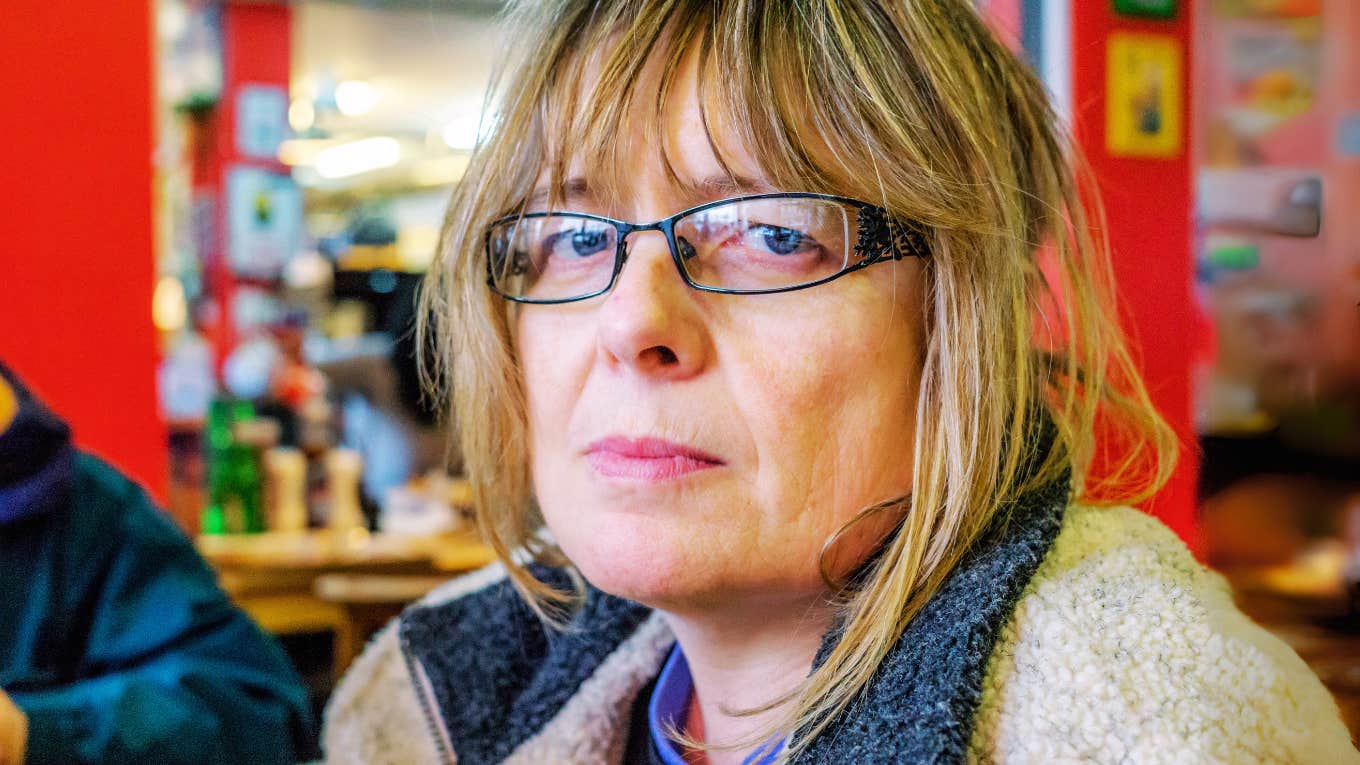I'm A Baby Boomer And My Old-Fashioned Values Have Been Forgotten — 'Kids Today Are No Longer Civilized'
I feel lost in today's uncivilized world.
 tirc83 | Canva
tirc83 | Canva Editor's Note: This is a part of YourTango's Opinion section where individual authors can provide varying perspectives for wide-ranging political, social, and personal commentary on issues.
I feel lost in today’s world. Sure, every generation seems to rebel against the older generation, but I didn’t, and I don’t think any of my peers did. Well, two of my classmates did, and they came to sticky ends.
The rest of us were content to live in the way we were taught:
- Always consider the impact of your actions on other people before doing them.
- Don’t cheat. Don’t lie. Don’t steal. Don’t take drugs. Don’t drink too much. Don’t get pregnant (before you are married).
- Do the work you are paid to do.
- Don’t be rude to other people.
- Give up your seat on the bus for older people.
- Don’t put other people in a difficult position by asking awkward questions.
- Always give others more than you take for yourself.
- Give others the benefit of the doubt, even if you do have doubts. You don’t need to be right.
- Dress elegantly, neatly, modestly.
- Don’t expect anything from someone else that you wouldn’t give yourself.
As a Baby Boomer, my old-fashioned values have been forgotten — younger generations don't understand the difference between right and wrong.
1. Younger generations often see everything as oppressed vs. oppressor
Somehow, today’s generations think that if one fails, then it must be because one is oppressed, and it’s all the fault of the oppressor. There is no understanding of the principle of the greater good for the greater number being the underlying premise for right and wrong.
Imagine if you and a dozen of your friends were all running away from twenty-five zombies. Would you kill them to survive? They are, after all, the living dead — not completely dead.
According to today’s standards, it’s the zombies that would need to be protected, because they are the oppressed. They don’t look as good as other people. They are always hungry. They are in a mess, and, of course, it’s the fault of everybody that they are zombies.
This kind of reasoning is bizarre to me. Am I the only one who understands that the matter of right and wrong has nothing to do with oppressor and oppressed — that most people who are at the bottom rung of the ladder are not there because they are oppressed?
The people in Iran are certainly oppressed, but not a single person in the free world is oppressed. What it appears they mean is that their feelings are hurt, that they aren’t accepted and lauded for who they are, that they are rejected, that they are not in the job they want, that they can’t afford to buy a house, and many other things that have nothing to do with being oppressed.
When our generation was rejected, couldn’t afford things, and couldn’t find jobs, we accepted it. That was life. We tried to find ways around it — we most certainly didn’t make it a government problem.
We also didn’t go around calling people names and telling them it was all their fault. From my perspective, I find it beyond bizarre.
Of course, if you start reading psychology books, they tell you that the younger generations never developed resilience — they can’t cope — and they have been taught that they are entitled to all sorts of things.
Nobody is entitled to anything. My generation knew that. Subsequent generations seem to struggle with that idea.
2. Younger generations are often quick to name-call and label
 voronaman / Shutterstock
voronaman / Shutterstock
I find the constant name-calling sickening — bigot, racist, Nazi, genocider, boomer, supremacist, etc. Godwin’s law comes to mind. If the only response to what one writes is to call the writer a bigot, racist, etc. then where is their argument?
Godwin’s law, also known as Godwin’s rule of Hitler analogies, is a statement maintaining that if any online discussion continues long enough, someone will almost certainly compare someone else to Hitler. Typically, the comment likens someone to Hitler or calls that person a Nazi, and the individual described in that way is often a participant in the discussion. The law is thought to apply to conversations about any conceivable topic.
Yet, I find more than that. There is so much emotion behind those accusations, as if my writing what I did, brought immense harm to the person who was hurling abuse at me.
I keep wondering what is going on inside them. Are they emotionally dysregulated? What makes them hurl falsehoods at people they don’t know? Why would they do this? Does it give them a momentary feeling of superiority, only for it to die ten minutes later, and then they have to find another victim?
3. Younger generations often lack the wisdom to truly lead
What is so tragic about all this is that the people who are wrapped up in their oppressor/oppressed ideology seem to have no idea that they will soon become the oppressors — in the eyes of the next layer of oppressed. Martin Niemoller’s poem pretty much sums it up.
I see a time when all the people who have been calling others oppressors will become oppressors themselves. It’s that kind of ideology, and none of them will be able to recognize right from wrong.
The plethora of rules I grew up with served a purpose. They kept society functioning. Then, somehow, all those rules were increasingly discarded by each successive generation. And now we live in a world where the most dreadful ideologies are dominant.
No doubt, I will be asked in super-aggressive voices what those values are. Then I will be called a racist, a bigot, a white supremacist, and everything else.
In a way, I marvel at the aggression and immaturity of these people. I marvel at their arrogance in thinking that they have a right to call people bigot, racist, supremacist, and a thousand other names, and they don’t know anything about the person they are talking to. It is pure evil, in my book. I feel lost, now.
4. Younger generations often project and assume
 Tavarius / Shutterstock
Tavarius / Shutterstock
I find the constant projection of mass idiocy horrifying. For instance, I recently wrote a piece on how shocked I was at the hypocrisy of the left.
Imagine my despair when I was accused of expecting America to be the world’s policeman, of Americans being sick of sending their troops elsewhere, of being a Trumpist, and many other things. I wondered if those readers had a problem with comprehension.
They showed no understanding of what I was saying. Instead, they projected onto my story what they had heard others saying.
This constant projection in any conversation comes from both the left and the right — it is a generational thing. My boomer generation did not do that. We did not assume that people were saying things that they weren’t saying.
Tessa Schlesinger is a writer who grew up in Africa and then lived in the UK, the US, and various countries in Europe, and brings with her a unique perspective on world events.

